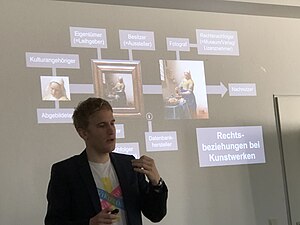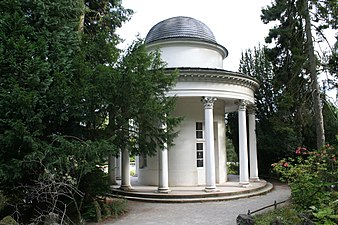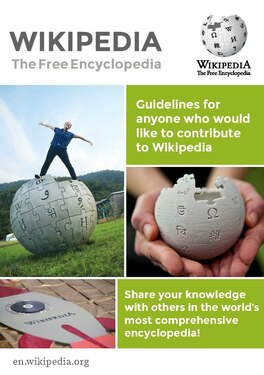Wikimedia Deutschland/Movement Report 2018/Volunteers
| Overview | Volunteers | Software Development | Conditions for Free Knowledge | Wikimedia Movement | Finances |
Attract, Support and Retain Volunteers
[edit]
Supporting and promoting community and community-initiated projects has been and continues to be an essential, central task of Wikimedia Deutschland since its inception. Our community support teams oversee the lending of technical equipment, the provision of financial project support, including stipends and reimbursement of travel costs, as well as logistical, administrative and organizational assistance for events, local hubs and other community projects. In addition, we are working towards reversing the decline in Wikipedia editors through testing a variety of approaches, including online campaigns, outreach, and new editor support.
The teams assure that volunteers are involved in continuous improvement of the support guidelines, and have online and offline spaces for exchange and collaboration. Supporting online activities is aimed at increasing the quality and diversity of content for the Wikimedia projects, while offline activities focus on increasing motivation, decreasing conflict and broadly promoting free knowledge.
In providing these services, our teams are led by a strong appreciation of volunteerism, seek continuous dialogue and participation, and strive towards a high level of satisfaction among volunteers. In 2018, we provided more tailored and intensive support for complex projects, and promoted projects that went across language and project communities.
Goal 1: The Wikipedia Community resumes growth. New volunteers feel welcomed, are motivated and contribute to Wikipedia.
|
![[Picture: One example for a banner used during WMDE's spring campaign 2018]](http://upload.wikimedia.org/wikipedia/commons/2/23/Neue_Ehrenamtliche_Fr%C3%BChlingsaktion_2018_Bannerentwurf_1.2.png)
The strategy for growing the Wikipedia volunteer community is two-fold:
- We prepare Wikipedia outreach banner campaigns with a high distribution rate
- We offer means for onboard people who have created new accounts
We set an ambitious objective for 2018: 400 new editors reach the 10th edit. We had learned about the ratio between distribution, new accounts and number of editors with 10+ edits in 2017. As a result, we knew that we would need at least three widely displayed banners to get to 400. The first campaign in the spring was very successful in terms of the resulting new accounts, which came to over 1,200. Our summer campaign, however, did not prove as successful in generating new accounts and answering some of our research questions, but it resulted in a new FAQ page being built for new editors that can prove to be useful for answering essential questions about Wikipedia even after the campaign were completed. In the fall, we opted for going offline and a very successful Wikipedia day was organized by communities and chapters in Austria, Switzerland and Germany with 850 interested visitors in total. Overall, the objective of 400 new editors was not achieved, as only 65 newly registered editors reached their 10th edit (data as of November, 30th) as a result of our campaigns. Nevertheless, the campaigns generated new insights and a lot of attention. The Wikipedia day will certainly be replicated in coming years.
At the same time, great progress was made in the development and implementation of trainings and onboarding materials. The outreach campaigns were combined with an expansion of different means of onboarding aimed at supporting new editors during that crucial first phase. We started with assessing the usefulness of the onboarding services we had offered in 2017. One of the next steps was the overhaul of training modules, which was done in close collaboration with community members. The Wikipedia Training Modules (available in English) were adapted for the German Wikipedia, translating them into German and re-producing the associated videos. After community review, the trainings were structured into four modules and these online courses are now available in German:
Based on the data analysis of our different campaigns, we know that new users who completed or begun one or two of these modules, registered a significantly higher number of edits than for those that had not taken the courses. From this, we concluded that good onboarding is essential for recruiting new active editors and further data supports this hypothesis. New users coming from our campaigns took 103 days (median time) to reach their 10th edit. For all other new users in 2018, they took 1,554 days (median time) to reach their 10th edit.
Our offline activities also proved to be successful: a series of trainings for conflict resolution were held in late 2018, being the first steps in creating a more welcoming atmosphere which in turn will hopefully make contributing to Wikipedia more attractive to new people. The majority of the 25 community members who participated in these trainings thought the content was interesting and relevant, and gave the courses a high overall rating (evaluation results). We take this as an affirmation for the direction we are taking with this, and will continue and expand on this project in 2019.
The Wikipedia day (see story below), which took place in 11 cities around Austria, Switzerland and Germany, not only generated a lot attention, but also showed us that advertising for single offline events holds a lot of potential. Several local groups also reported that a number of visitors returned to other community events and showed a continued interest in engaging with Wikipedia and its communities. A good sign that shows us the importance of offline engagement yet again.
To stay updated about our activities in this field, please check the project page on de:wp (German only).
Story: Wikipedia Day - An unexpected, huge success (by Christine Domgörgen) |
 The local Wikipedia space WikiBär in Berlin is completely packed. Even for the Wikipedians, who want to enter the local community room as organizers, there is no getting through, so big is the crowd of visitors on the Wikipedia day. Similar to the Berliners, the other local groups were on the spot on Sunday, 28 October 2018, at the first ever Wikipedia day. A total of eleven local groups in German-speaking countries opened their doors to visitors. Around 850 interested people accepted the invitation to take a look behind the scenes of Wikipedia in Ulm, Augsburg, Stuttgart, Munich, Cologne, Hanover, Hamburg, Berlin, Zurich, Linz and Vienna. Should you send a screenshot to Wikipedia if you find an error? Why is Wikipedia so accurate and reliable even in science? How is content controlled? Questions like these were asked by the visitors – and they were often very surprised that “real” people were actually behind Wikipedia. Some already active authors also found their way into the local group space for the first time via the Wikipedia day. The program was as varied as the opportunities for volunteering in Wikipedia. In addition to creating and editing articles, photos also played a major role: for example, visitors to Stuttgart were able to scan historical photos they had found in their attic. Insights into drone photography were offered. At the local space in Cologne, traditional Cologne dishes were photographed such as bean soup with chicken. The Augsburg community organized a photo walk during which cultural-historical monuments and a museum were visited and documented. Originally planned edit workshops for beginners were not feasible in some places due to the large crowds. Instead, spontaneous lectures and question and answer sessions were quickly improvised. The visitors, from babies to grandpas, were all very interested – many stayed on site for several hours, even sticking around in the evening after the end of the official program. The idea: new ways of winning new editors For new editors, personal contact can be very helpful when starting to edit Wikipedia and has been offered by many Wikipedians for many years by means of introductory courses, open editing and other formats. The idea for the Wikipedia day emerged in order to build on existing formats, combining online and offline actions, and support local groups in the implementation of various ideas and formats. Not only were interested people able to get to know the people behind Wikipedia, but they could also learn everything they always wanted to know about the online encyclopedia. Local communities were able to present their work and projects, and new editors were shown how to participate. Thus, the first steps in Wikipedia were facilitated through personal contact. From an organizational perspective, the Wikipedia day was a major experiment. For the first time ever, we organized a cross-national offline event together with local communities and Wikimedia organizations in Germany, Austria and Switzerland. The eleven local Communities put their hearts and souls and a lot of work into the planning, organizing and the promotion of the Wikipedia day. An online-banner ran for ten days in the German Wikipedia to draw attention to the upcoming event. 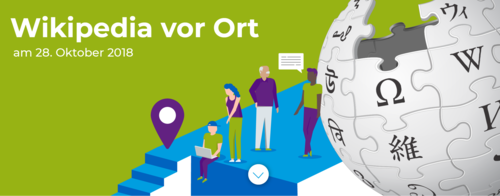 Prior to the event, nobody could be certain about the number of actual visitors that would find their way to one of the local spaces on a Sunday. It was not only the Cologne Community members who expected “a rather relaxed working day”. Everyone was all the more surprised and pleased about the big crowds, as you can read on Twitter. The conclusion in the words of the Munich community: “A huge success”. The promised look behind the scenes of Wikipedia obviously drew a lot of visitors. It is great to see what the local communities can accomplish together. Congratulations to all people who took part in the Wikipedia day – we are looking forward to a repeat in 2019!
[This article was first published on the WMDE blog on March 22, 2019 and has been slightly shortened for this report.]
|
Goal 2: We continue Wikimedia Deutschland’s volunteer support services while developing these services further, together with communities. Our community and project support services become more effective and benefit a greater diversity of groups. In this manner we make it easier for volunteers to contribute to free knowledge. |

In the first half of the year, our team was extremely busy with managing the consequences of the new EU Guidelines on data privacy (GDPR), which went into effect on May 25th. It was very important to us to make sure we are compliant with the new laws, establish the necessary internal policies and processes and assure that our community members are well informed and provided with ways to make the choices they have. This took up significant resources from team members, delaying some of the activities we had planned around developing project support services.
Despite this binding of resources earlier in the year, the level of satisfaction and usefulness regarding community support offered by the WMDE was rated very positively by the recipients of support (average ratings of >9 out of 10 points, based on 450+ feedbacks in 2018). This shows that our community support has been developing quite well. Despite not supporting more individuals with bigger projects in 2018 (compared to 2017), our support model could successfully be extended to new community groups such as the OpenStreetMap community. We were also able to improve our help available for larger projects as well as local spaces. As planned, we started to provide more intensive, tailored support to projects with higher complexity and will continue to work in this direction in 2019. Some of these were:
- WikiCon in Switzerland
- Wikipedians at the Frankfurt Book Fair
- Youth Olympic Games (YOG) in Buenos Aires
- Cross-border WikiAlpenforum (WAF)
- Wiki Loves Monuments 2018
Story: Wiki Loves Monuments goes European Year of Cultural Heritage (by Martin Rulsch) |
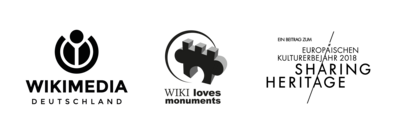 Earlier in 2018, we started activities for a new project: Wiki Loves Monuments goes European Year of Cultural Heritage. This project, in part funded by a grant from the federal government, seeks to grow and broaden Wiki Loves Monuments with a special focus on European Cultural Heritage. Photographers are charged with finding subjects that reflect European history and culture, and explore what this means for them. In the European Year of Cultural Heritage 2018, Wikimedia Deutschland further developed the photo contest WLM together with volunteers and aimed to make the contest more visible in public. By creating a special international prize, awareness was raised for the significance of the European cultural heritage and its history among the international Wikimedia communities and the general public. Where can we find traces of shared European history? Which monuments in my vicinity are part of our shared history? The special prize were meant to encourage people to actively look for traces of this history and invites people of all ages to explore the cultural heritage. We wanted to especially motivate young people for the topic of cultural heritage as well as people who have not yet run projects with cultural heritage institutions.The general public itself was encouraged to participate in our project “Wiki Loves Monuments goes EYCH” through Wikipedia banners and a multi-media communication strategy. All initiatives aimed to embed the topic of European cultural heritage in the Wikimedia movement beyond the end of this project. The project itself was funded by the Federal Government Commissioner for Culture and the Media as part of the European Year of Cultural Heritage 2018 and was represented among many other projects in the German portal. The individual initiatives of this project were explained in more detail on our project page (German only). One of the first events of this project was a photo workshop for young people under 25 in early June 2018. In this workshop, young photo enthusiasts and all those that wanted to become one, learned from experts how to take high quality photographs of monuments and submited them to the photo contest Wiki Loves Monuments. At the end of the workshop, the participants discussed how they themselves could potentially replicate these workshops in their local contexts. The entire workshop was also recorded on video and could thus be used to show how to get involved as a volunteer in Wikipedia and contribute to the European Year of Cultural Heritage. By actively supporting the production of 360° photos for Wikipedia, volunteers also created a new perspective on monuments and their heritage. During a weekend in Leipzig, a professional photographer, specialized in 360° photography, presented what technology is available and how it can be used. In addition to the logistical organization and financing of the event provided by Wikimedia Deutschland, attendees were also able to test the practical implementation in the ballroom of the Old Town Hall in Leipzig. Indoor photography is often not permitted in such spaces. In order to enable these parts of the monument to be documented, Wikimedia Deutschland has published an information brochure for cultural heritage institutions, supported by the German Commission for UNESCO and the German National Committee for the Protection of Monuments. The information brochure was also included in the materials given to the 22 volunteers trained as Wikipedia cultural ambassadors in September. The training encompassed different perspectives on cooperations with cultural heritage institutions: Once again, the German Commission for UNESCO could be won as a partner organization and presented on the topic of humanity’s heritage. A citizens’ association in Kassel and an employee of the National Museums in Berlin talked about how their own cooperation succeed – this goes to show that Wikimedia Deutschland is part of a large network in the cultural landscape. Wikimedia Deutschland presented its volunteer support and projects with cultural institutions. Finally, a copyright expert explained how free licenses work when cooperating with cultural and memory institutions. Upon the completion of the training, the volunteers received a certificate of participation and are endorsed as cultural ambassador. Since this training was received with much praise by participants, Wikimedia Deutschland will continue the cultural ambassadors trainings in 2019. With the new knowledge, documents and official certificates, we look to the future with optimism that further opportunities will open up to advance Free Knowledge within society.
|
Our Objectives for 2018
[edit]| Objective:
In 2018, as a result of Wikimedia Deutschland’s activities, 400 new editors reach their 10th edit. |
Outcome (end of 2018):
As a result of our online campaigns, 65 newly registered editors reached their 10th edit (data as of November, 30th). |
Not met |
| Objective:
In close coordination with community members we develop onboarding activities to ease the entry of new Wikipedia editors. These opportunities are utilized and viewed as helpful by new users. |
Outcomes (end of 2018):
|
Reached |
| Objective:
We create at least two trainings around communication and conflict resolution skills that are utilized by community members and viewed as helpful. |
Outcome (end of 2018):
Conducted two conflict resolution trainings (25 participants in total, concept and content was rated as (very) good and relevant by 88% of the participants). Will be continued/ expanded in 2019. |
Reached |
| Objective:
We search for ways to make the operation of Wikipedia easier for new users. We document barriers to usability for new authors and the resulting ideas are prioritized according to their potential, in order to assess them in terms of their feasibility. |
Outcome (end of 2018):
Two research workshops (one at WikiCon 2019, one at WMDE internally) to explore potential barriers. Two further workshops will follow in early 2019 to verify the results. First findings are generally in line with WMF’s New Editors research. We will also closely observe the experiences made with the prototypes currently developed by the WMF and, if promising, promote its adaption for DE-WP. |
Reached |
| Objective:
The number of unduplicated people applying for Wikimedia Deutschland support for a project over 500 EUR increases by 10% compared to the prior year. (Target 2018: 71 / Baseline 2017: 64) |
Outcome (end of 2018):
Number of individual people applying for support of larger projects: 65 (Aug 31 2017 - Sept 1 2018) We failed to increase this number by 10%. Additional campaigning to promote WMDE’s support offers had to be cancelled due to occupation of staff with several other support initiatives/ projects. |
Not met |
| Objective:
The average assessment of volunteer support by the volunteers reaches an average of nine out of ten points in terms of satisfaction and usefulness, as evidenced by continuous application and analysis of the volunteer support survey tool. (‘Förderbarometer’ = “Support Barometer”) |
Outcome (end of 2018):
Satisfaction rating: 9.16 (scale 0-10, mean value, n=457) Usefulness rating: 9,31 (scale 0-10, mean value, n=445)
|
Reached |
| Objective:
The support of volunteer projects (new projects/>5,000 EUR) improves and, if requested, becomes more thorough, comprehensive and customized. The enhanced project support will be evaluated as particularly helpful. |
Outcome (end of 2018):
More thorough, comprehensive support was applied to all larger, more complex volunteer projects and evaluated as helpful. Nevertheless, we were not able to provide all local hubs with more comprehensive support, which will be a focus throughout 2019. Example projects:
|
Reached |
| Objective:
At least three projects have been initiated and implemented jointly with other volunteer communities. We will evaluate cooperative projects for their impact, using a common evaluation framework. |
Outcome (end of 2018):
|
Reached |





